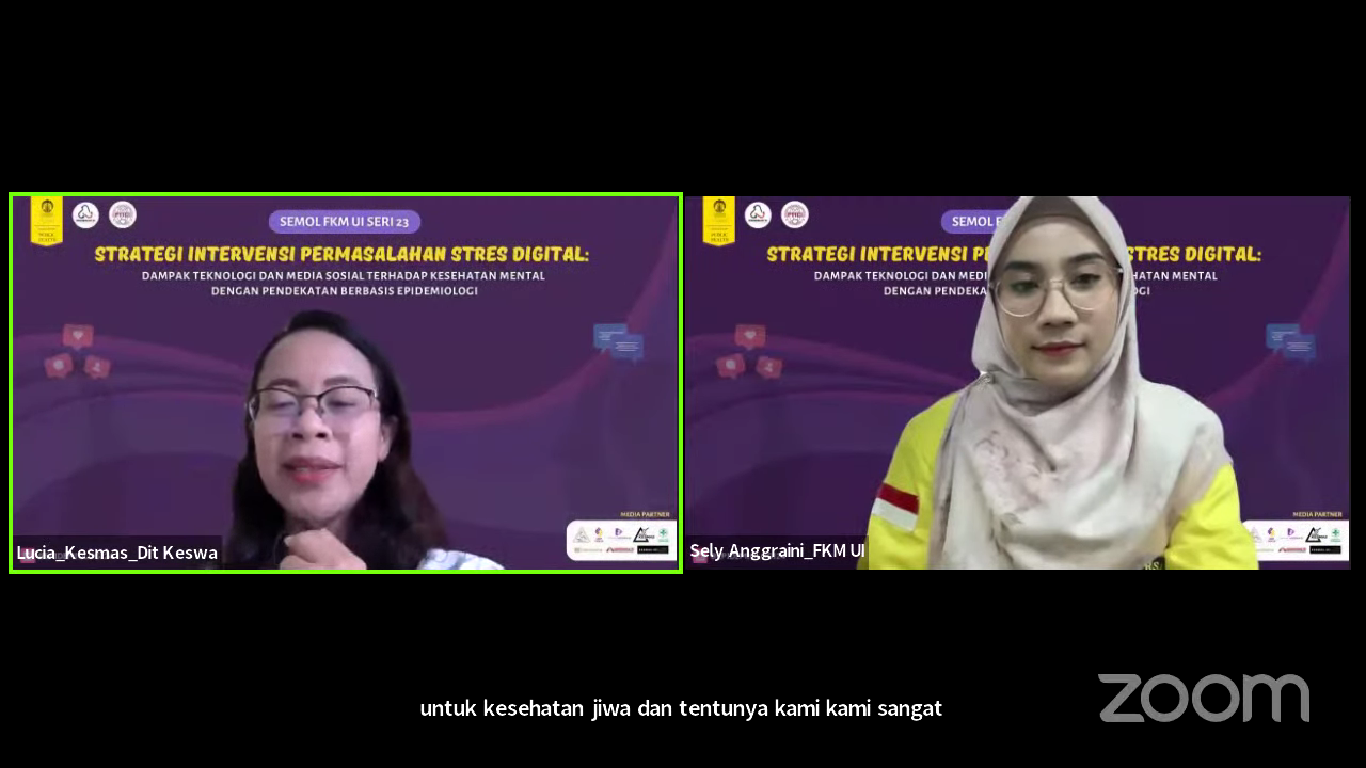The Faculty of Public Health (FPH) at the Universitas Indonesia (UI) once again held the 23rd series of its Online Seminar (SEMOL) with the theme “Strategies for Intervening Digital Stress Issues: The Impact of Technology and Social Media on Mental Health with an Epidemiology-Based Approach” on Saturday, November 9, 2024. The seminar invited two expert speakers and provided a holistic discussion on the impact of technology and social media on mental health.
The Education Manager at FPH UI, Dr. Laila Fitria, S.K.M., M.K.M., expressed her support in the opening speech. “This seminar addresses a highly relevant theme for today’s dynamics. Digital stress affects people across various age groups. We hope that this seminar can facilitate a comprehensive discussion to explore solutions we can implement together to face this issue,” Dr. Laila stated.
In alignment with Dr. Laila, Dr. dr. Helda, M.Kes., the Head of the Master of Epidemiology Program at FPH UI, shared, “We have observed a recent tendency of increasing cases related to stress and mental health disorders. Therefore, understanding this phenomenon, especially from an epidemiological approach, is crucial in addressing the root causes. This seminar will delve deeper into digital stress patterns, their impact on mental health, and the intervention strategies that can be implemented.”
The first speaker, Dr. Lucia Maya Savitri, M.A.R.S., Head of the Mental Health Promotion and Partnership Working Team at the Directorate of Mental Health, Ministry of Health of the Republic of Indonesia, delivered a presentation titled “Current Global and Indonesian Mental Health Situation, and Its Management and Policy Responses.” In her presentation, she mentioned that approximately 970 million people worldwide live with mental health issues. However, 71% of these individuals do not receive mental health services due to the insufficient allocation of resources for mental health, which constitutes only an average of 2% of health expenditures.
Meanwhile, in Indonesia, mental health disorders are the second leading cause of Years Lived with Disability (YLDs). Depression, anxiety, and schizophrenia are the three most prevalent disorders, similar to global occurrences. “The high number of mental health issues poses a challenge for us to improve mental health literacy, as it is just as important as physical health. There is no health without mental health,” Dr. Lucia remarked.
Nonetheless, the Ministry of Health has implemented Health Service Transformation through strengthening primary care services and integrated mental health services within them. This is conducted comprehensively throughout the entire life cycle, from promotive to rehabilitative efforts. Dr. Lucia also shared that strengthening and collaboration across programs and sectors are being carried out to support mental health services.
Further, Dr. Ashra Vina Daswin, a Mental Health Practitioner, presented on the topic “Digital Stress, The Impact of Technology and Social Media Use on Mental Health, and Strategies for Managing It with an Epidemiology Approach.”
Digital stress is defined as difficulty in dealing with new technology in a healthy way. This stress and anxiety are caused by constant notifications from the use of information and communication technologies via mobile devices and social media. Dr. Ashra explained that since the COVID-19 pandemic, the use of technology as a communication tool, workspace, source of information, and entertainment has increased significantly, followed by a rise in digital fatigue and well-being concerns. “Around 40% of people are more digitally connected than physically in the real world, and approximately 64% state that they build meaningful connections with others,” Dr. Ashra said while discussing how people perceive the use of technology.
She explained that there are at least four causes of digital stress, namely Always-on Culture (the perceived obligation to be available 24/7 to interact with others), Information Overload (receiving too much information with no time to analyze it), Digital Multitasking (the cognitive demands of navigating multiple apps and online tasks), and Unclear Boundaries (lack of clear work-life boundaries).
However, many countries, including Indonesia, have already implemented various policies to address these issues. “Currently, the health sector is no longer the only sector addressing stress prevention; many non-health sectors are also involved. This is evidenced by the large number of journals related to digital stress and workplace health, many of which are published by conservative companies rather than health-related journals,” Dr. Ashra explained.
It is hoped that cross-sector collaboration and improved mental health literacy will provide more comprehensive solutions to mitigate the impact of digital stress, enabling people to lead healthier and more balanced lives in the midst of rapid technological advancement. This seminar is expected to serve as a positive first step in the collective efforts to create a more supportive environment for mental health in the digital era. (ITM)

